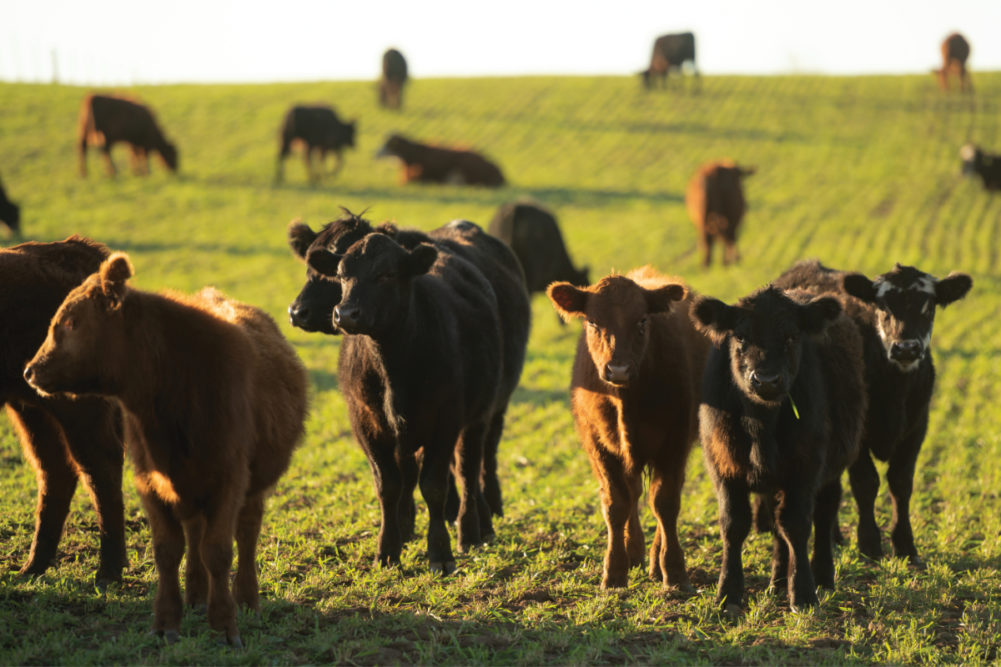Sustainability: It’s a hot topic, grabbing headlines and making its way onto labels at meat cases as consumers become more conscious about the food system and its impact on societies and the planet. As the final part of the supply chain, grocers directly touch consumers and have a unique role in getting customers the beef they crave. Regardless of the label, retailers can rest assured that the product they’re selling is not only sustainably raised, but also positively contributing to society and the economy.
Three Pillars
The United States produces the most sustainable beef in the world thanks to decades of innovation and the dedication of US cattle farmers and ranchers to continuous improvement. This dedication is present throughout the beef lifecycle and touches every part of the supply chain, from pasture to plate, ensuring the production of high-quality beef in the most sustainable way possible.
A sustainable food system is comprised of three different, but intersecting, pillars:
- Environmental sustainability encompasses biodiversity, carbon and water footprints, wildlife habitat, soil and rangeland health and the ability of cattle to consume human inedible feeds, among others.
- Social sustainability consists of beef’s contributions to society, with the most prominent being the provisioning of high-quality protein which contributes to a nutritious diet. Additionally, worker safety, animal welfare and technology use are priorities of the beef industry with other contributions coming from recreational value, tourism, and the culture and traditions of beef producers as farms and ranches are passed down from one generation to the next.
- Economic sustainability includes the overall economic impact of the beef industry, local contributions that improve rural economies and livelihoods, affordability of beef to consumers and the ability of farmers and ranchers to continue producing high-quality beef.
True sustainability is a balance of these three aspects, which prioritizes the planet, people, animals and progress.
Beef and the Planet
The United States produces 18% of the world’s beef with just 6% of the world’s cattle, and it does so while caring for the planet.
In fact, according to the US Environmental Protection Agency (EPA), greenhouse gases (GHG) from beef cattle only represent 2% of emissions in the United States. These noteworthy numbers are possible because of improvements in management practices, genetics, and the nutritional quality of feed.
Another inherent advantage of beef is cattle’s ability to upcycle human-inedible plants into high-quality protein. 90% of what cattle eat comes from forage and plant leftovers that cannot be consumed by humans and would otherwise go to waste. Responsible use of resources such as land and water also contribute to the environmental sustainability of beef.
Despite the hype around “plant-based” diets, it should be noted, if all US livestock were eliminated and every American followed a vegan diet, GHG emissions would only be reduced by 2.6%, or 0.36% globally.
Social Impact
Worker safety and animal welfare are of paramount concern to the beef industry and it is only by prioritizing the people and the animals that the industry can continue to produce high-quality protein – which is likely the most prominent aspect of societal contribution. With 10 essential nutrients and on average, 25 grams of protein per three ounce serving, lean beef supports a healthy lifestyle and provides the nutrients for bodies to thrive throughout all life stages. It’s important to recognize cattle also contribute more than twice as much high-quality protein to the US food supply than they consume, directly contributing to food security.
In addition to the nutritional and other societal contributions outlined, beef farmers and ranchers are integral members of their communities. 91% of US beef farms and ranches are family-owned, and 78% of cattle producers plan to continue to invest in their communities by passing their operation down to future generations.
Economic Impact
According to a forthcoming economic contribution of the US beef industry report, the beef industry produces more than 27 billion pounds of beef annually, which provides 144 billion three-ounce servings and contributes $30 billion in total value added to the US economy.
And when it comes to beef sustainability, the bottom line is that the beef industry is focused on sustainability and continuous improvement in all three pillars. Supply chain partners can be at peace knowing that the beef they sell has an overall positive environmental, social and economic impact on the industry and society at-large.
To learn more about the US beef industry’s commitment to responsibly and sustainably raising beef and the resources available for retailers, visit BeefItsWhatsForDinner.com.
Myriah Johnson is senior director, Sustainability Research, and Jess Soule is associate director, Beef Sustainability Research, at the Denver-based National Cattlemen’s Beef Association, a contractor to the Beef Checkoff. The Beef Checkoff Program was established as part of the 1985 Farm Bill. The checkoff assesses $1 per head on the sale of live domestic and imported cattle, in addition to a comparable assessment on imported beef and beef products. States may retain up to 50 cents on the dollar and forward the other 50 cents per head to the Cattlemen's Beef Promotion and Research Board, which administers the national checkoff program, subject to USDA approval. The National Cattlemen’s Beef Association (NCBA) is a contractor to the Beef Checkoff Program. The Beef Checkoff Program is administered by the Cattlemen’s Beef Board, with oversight provided by the U.S. Department of Agriculture.

